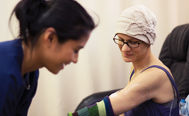- Radiation – The use of radioactive substances for the diagnosis or treatment of diseases.
- Radiographs – Also known as x-ray studies, radiographs are used to examine bones and soft tissues of the body. A radiograph image shows all structures superimposed on one another. A doctor may request x-rays of many parts of the body.
- Radiologist – A doctor who specializes in the practice of radiology.
- Radiology – A branch of medicine that focuses on the use and study of radioactive substances to treat and diagnose disease.
- Randomization – Randomized clinical trials assign patients, in no particular order, to different groups A a study (for example, one group receives the research drug and the other group receives the usual treatment). Randomization reduces the risk of favoritism in the patient selection process. To make it fair, a computer performs the randomization process; your doctor is not involved.
- Randomized trial – A research study design A which patients are randomly assigned (in no particular order) to receive different treatment regimens.
- Recurrence – The return of a primary cancer that previously showed no signs of activity.
- Red blood cell – Red blood cells are made in the bone marrow and released into the blood. They circulate in the blood and carry oxygen and carbon dioxide to and from every cell in the body.
- Refractory – When a disease is said to be refractory, it means that it is unaffected by treatment.
- Regimen – A plan of treatment, including doses, scheduling, and duration of treatment.
- Regression – The shrinkage of a cancer or a decrease in the signs and symptoms of the cancer in response to treatment.
- Relapse – The recurrence of disease after an apparent recovery.
- Remission – The disappearance of a cancer, as determined by clinical evaluation, resolution of symptoms, or both. Complete remission is the disappearance of all signs of cancer after treatment. Partial remission is a notable decrease in cancer cells, but not their complete disappearance, in response to therapy.
- Research nurse – A nurse that specializes in clinical trial studies. He or she is generally responsible for talking to patients about the study, helping monitor patients in the study, and collecting and reporting study data.
- Risk factor – Anything that increases the chance of getting a certain disease, such as cancer. Some risk factors can be controlled, such as smoking. Other risk factors, such as age and race, cannot be controlled.

Blog


